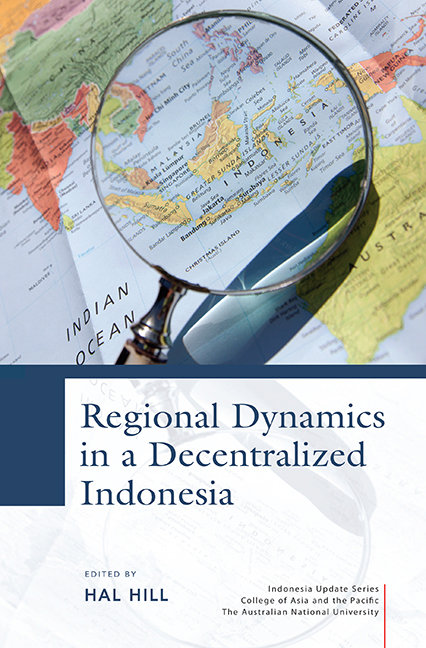Book contents
- Frontmatter
- Dedication
- Contents
- Tables
- Figures
- Contributors
- Acknowledgments
- Glossary
- Map of Indonesia
- 1 An introduction to the issues
- PART 1 HISTORICAL, ECONOMIC, POLITICAL AND SOCIAL PATTERNS
- PART 2 DECENTRALIZATION AND GOVERNANCE
- PART 3 LOCAL-LEVEL PERSPECTIVES
- 10 Dilemmas of participation: the National Community Empowerment Program
- 11 Governing fragile ecologies: a perspective on forest and land-based development in the regions
- 12 Explaining regional heterogeneity of poverty: evidence from a decentralized Indonesia
- PART 4 MIGRATION, CITIES AND CONNECTIVITY
- PART 5 CHALLENGES FOR INDONESIA'S PERIPHERY
- Author index
- Subject index
- INDONESIA UPDATE SERIES
10 - Dilemmas of participation: the National Community Empowerment Program
from PART 3 - LOCAL-LEVEL PERSPECTIVES
Published online by Cambridge University Press: 21 October 2015
- Frontmatter
- Dedication
- Contents
- Tables
- Figures
- Contributors
- Acknowledgments
- Glossary
- Map of Indonesia
- 1 An introduction to the issues
- PART 1 HISTORICAL, ECONOMIC, POLITICAL AND SOCIAL PATTERNS
- PART 2 DECENTRALIZATION AND GOVERNANCE
- PART 3 LOCAL-LEVEL PERSPECTIVES
- 10 Dilemmas of participation: the National Community Empowerment Program
- 11 Governing fragile ecologies: a perspective on forest and land-based development in the regions
- 12 Explaining regional heterogeneity of poverty: evidence from a decentralized Indonesia
- PART 4 MIGRATION, CITIES AND CONNECTIVITY
- PART 5 CHALLENGES FOR INDONESIA'S PERIPHERY
- Author index
- Subject index
- INDONESIA UPDATE SERIES
Summary
INTRODUCTION
In 2006, the Indonesian government committed to a community-driven development program on a nationwide scale. Project planners subsequently rolled out this program across nearly 70,000 villages in 6,681 subdistricts (kecamatan) from Aceh to Papua. A scaled-up version of a program pioneered by the World Bank, the initiative created one of the largest and most publicized international examples of a ‘social capital’ turn in development programming. Over the period 2007–12, $1,200 million (Rp 1.2 trillion) was allocated to the program.
The National Community Empowerment Program (Program Nasional Pemberdayaan Masyarakat, PNPM) came out of years of research and policy work on the need for beneficiary participation in development (Hickey and Mohan 2005), and followed the mainstreaming of social capital ideas in public policy (Bebbington et al. 2004; Fine 2010). This approach derives from the original argument that social capital not only facilitates collective action and economic development, but also is ultimately the mechanism that connects the two (Woolcock 2010: 481). Social capital, embedded in participatory groups and encompassing shared understandings of fairness, leadership, rights and duties, has come to represent a resource that can be mobilized and built upon for developmental ends (Nakagawa and Shaw 2004).
Through its Social Capital Initiative, the World Bank took up this idea and applied it across the globe in community-driven development (CDD) and social fund approaches. These aimed to get communities involved in choosing how funds might be spent and monitoring the progress of the projects they chose, thereby developing interventions that more effectively supported community development and fostered local accountability mechanisms. In some respects this represented a logical extension of the decentralization of government taking place across Indonesia. However, rather than devolving authority through state actors who were to be held downwardly accountable, the new CDD initiatives aimed to avoid accountability deficits within the state by establishing parallel frameworks to engage local participation. Accordingly, the PNPM program has two main components: facilitation of participation in the selection, design and implementation of local development projects, and accountability mechanisms to achieve this goal (King, Samii and Snilstveit 2010).
- Type
- Chapter
- Information
- Regional Dynamics in a Decentralized Indonesia , pp. 233 - 259Publisher: ISEAS–Yusof Ishak InstitutePrint publication year: 2014

